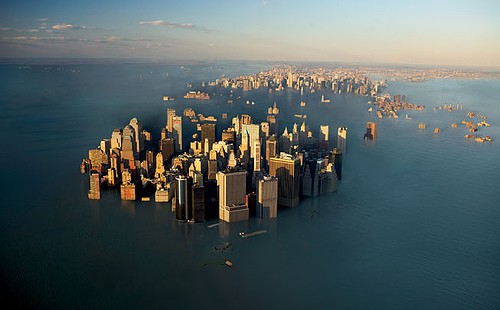Like millions of Americans this winter, I sat in front of the TV, freezing and wrapped in a blanket. I kept waiting for the network news shows to utter the two most obvious words raised by the weather patterns of the past several months: climate change. We heard, repeatedly, about yet another “arctic blast,” the “inescapable winter,” and various efforts to describe the wayward ways of the “polar vortex” — “a cyclone that sits over the poles” with a counterclockwise rotation, one CBS meteorologist offered.

But we waited in vain for reporters to interview scientists about how these dramatic weather extremes are related to — and, in fact, evince — what has been unfortunately named “global warming,” a term suggesting that only heat waves could be evidence of climate change. CBS News did, however, interview the general manager of the Edinburgh Golf Course in Minnesota about how the course came through the winter.
Rather than using the drought in California, the oddly tropical weather at the Sochi Olympics, or the unrelentingly frigid temperatures throughout much of the United States as pegs for serious coverage of the costs of climate change, the Weather Channel, went into a naming frenzy, with each storm, however fearsome or tepid, getting a moniker like Kronos or Maximus or, my favorite, Seneca (the wise storm?), all proposed by Bozeman, Montana, high school kids. The channel started personifying storms in 2012, explaining that this was “the best possible ways to communicate severe weather information on all distribution platforms.” But their anthropomorphizing of storms as toga-clad gods trivializes the rise of extreme weather and contributes to what has come to be called “weather porn”: the rabid flogging of the disasterous aspects of storms at the expense of all else.
In February, CBS Morning News sought to explain why northern California was being run over by something named the “Pineapple Express.”
“So, what’s causing all this?” asked host Charlie Rose. “Well,” responded CBS contributor Michio Kaku, “the wacky weather could get even wackier.” Kaku, a physics professor, then explained that the polar vortex was like a “swirling bucket of cold air” that was spilling into the continental United States because the North Pole is melting and tied it to the broader problem of climate change. “I’m really trying to follow you,” said anchor Gayle King, struggling to connect the dots. She then asked, “What can be done about it?”
“Well,” Kaku responded, “it seems to be irreversible at a certain point, so we may have to get used to a new normal.”
How’s that for promoting utter resignation and inaction?
As for the Sunday talk shows, according to Media Matters, they devoted only 27 minutes, collectively, to climate change in 2013. In February, ABC’s This Week and NBC’s Meet the Press finally gave the topic real airtime. However, they did so in the most irresponsible way possible. NBC staged a “debate” between Bill Nye, the “Science Guy,” and a climate-change denier, Tennessee Congressman Marsha Blackburn, who asserted, falsely, that “there is not agreement around the fact of exactly what is causing” climate change.
ABC pitted climatologist Heidi Cullen against Republican Governor Pat McCrory of North Carolina, who said in 2008 that “climate change is in God’s hands” (though he later backtracked). While both shows sought to refute the vacuous bromides of these GOP dunces, the fact that they gave them equal time, when 97 percent of climate scientists agree that climate change is a fact and is human-influenced, suggests there is a real debate when there isn’t and legitimates doing nothing in response.
Of course, if you watch Fox News, the frigid weather “proves” that “global warming” is a myth. Indeed, Fox mentioned climate change nine times in one week in January in order to ridicule it. As its contributor, George Will, asserts, “the climate is always changing.” Well, yes, especially in the past two decades, which were the hottest in 400 years.
We’ve become resigned to event-driven, decontextualized news, but when the issue is as pressing, costly, and dangerous as climate change (floods, water shortages, severe hurricanes and tornadoes, droughts), we need fewer storms named after Greek gods, fewer numbskull climate change deniers, and more coverage about what’s actually happening, what we can and must do, and how we can do it.
Susan J. Douglas writes on a variety of topics for In These Times.
